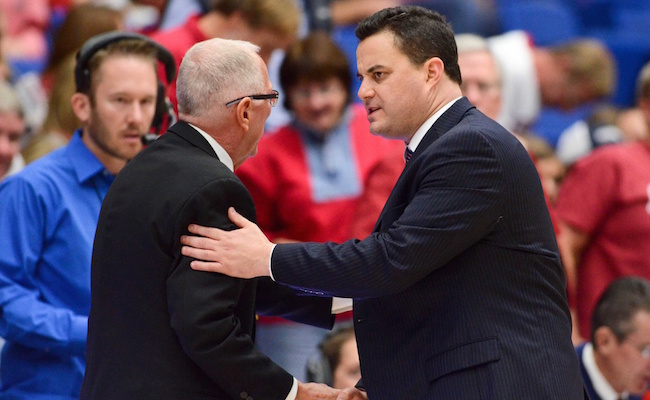This year's Battle 4 Atlantis men's basketball tournament in
the Bahamas has an exceptionally strong field of teams. Four of the eight,
including UCLA, are ranked in the Associated Press top 25 media poll. Two are
in the top five.
In many respects, it is an ideal setting for basketball.
Outside, waves will crash. Inside, sneakers will squeak. And, at the casino
adjacent to where the games will be played, chips will clink.
It's excitement you can bet on. Atlantis, the resort playing
host to the tournament, offers a sports book.
Less than a week ago, the NCAA and the major professional
sports leagues successfully blocked New Jersey's effort to allow sports
wagering at racetracks and casinos. But on Wednesday, the NCAA will allow eight
schools to play in a nationally televised basketball tournament in the Bahamas,
which has an economy dominated by tourism and a sizable gambling industry.
Though the NCAA bars its championship events from being held
in states that offer sports wagering, it permits schools and conferences to
play where they please.
Last week, another major tournament, the Naismith Memorial
Basketball Hall of Fame Tipoff, was held at Mohegan Sun, a Connecticut casino.
Four conferences, including the Pac-12, hold league tournaments in Las Vegas,
and the American Athletic Conference holds its women's basketball tournament at
Mohegan Sun.
"It's the big 'h' word — hypocrisy," said Daniel
Wallach, a leading gaming and sports litigator at Becker & Poliakoff in
Fort Lauderdale, Fla. The NCAA, he said, is "vehemently opposed to having
betting taking place on their games, yet the existence of this tournament
contradicts that."
The NCAA said its championship policy "is in place to
ensure the integrity of the game, provide consistency in awarding NCAA
championships and to address concerns for student-athlete well-being," in
a statement to the Los Angeles Times provided by a spokeswoman.
The NCAA did not respond to multiple requests from The Times
for further comment. In court documents, the NCAA has argued sports gambling
"undermines the public's faith and confidence in the character of amateur
and professional team sports."
Yet, tournaments such as the Battle 4 Atlantis remain
appealing. UCLA Athletic Director Dan Guerrero said nationally televised,
high-profile tournaments provide prime exposure that helps with recruiting.
The Battle 4 Atlantis has a reputation of attracting a
strong field, which helps participants build their NCAA tournament resumes. And
the location, on Paradise Island, makes it a draw for fans.
"All those things, that whole package if you will,
makes it an attractive situation," Guerrero said.
Two years ago, the Pac-12 became the fourth conference to
hold its men's basketball tournament in Las Vegas. Pac-12 Commissioner Larry
Scott announced the move from poolside at the MGM Grand hotel-casino, which is
host of the tournament.
"For hard-core basketball fans, this is going to be
like Disneyland," Scott said.
Since moving from Los Angeles to the MGM Grand, attendance
has increased, said Erik Hardenbergh, a Pac-12 spokesman. Fans, he said, enjoy
the attractions of Las Vegas and the proximity to the conference's schools.
Before the NCAA tournament in March, the NCAA requires
student-athletes to sign an affidavit, which includes five questions that probe
sports-wagering connections. Student-athletes, university staffers and
administrators and conference officials are prohibited from participating in
any version of sports gambling, including fantasy leagues for money.
The Pac-12 does not impose additional restrictions during
the Pac-12 tournament, though schools can set their own policies.
Hardenbergh said the schools have grown accustomed to
playing in Nevada and other states that allow sports wagering. The schools'
leaders, he said, concluded their students weren't at risk, though Guerrero
said he lobbied to keep the tournament in Los Angeles.
"From our standpoint, we feel comfortable,"
Hardenbergh said.
MGM Grand casino patrons are free to bet on the tournament's
games.
"Given the proximity of so many casinos around that
area, it wouldn't make sense just to take the game off one casino,"
Hardenbergh said. "They could just go next door."
Wallach, the gaming lawyer, said holding tournaments in
states with regulated gambling makes suspicious behavior — a large swing in the
betting line, for example — easier to track. Estimates on the size of the
sports gambling industry range from about $380 billion to $500 billion
annually. Only a fraction of that is wagered legally.
In the Bahamas, the legal gambling age for visitors is 18,
though Bahamians are prohibited from gambling.
In the past, UCLA has allowed student-athletes over 21 to
play floor games on Las Vegas trips. This time, Guerrero said, that won't be
the case.
"We've certainly indicated to our student-athletes that
we do not want them in the casino, and certainly not betting," Guerrero
said. "There's no question about that. They're there to play
basketball."










